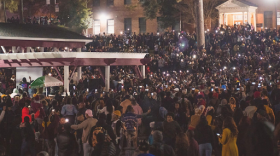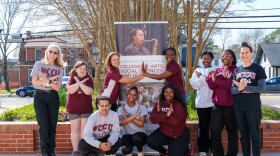This pandemic graduation season has been especially exciting for students who were literally able to walk across a commencement stage this Spring. These are students who had to study virtually online, whether they wanted to or not.
My family and I were overjoyed when my youngest son, Teemer Barry, graduated from the University of Maryland – Eastern Shore. We screamed and cheered when his name was read aloud by the announcer.
UMES is a small historically Black university, tucked away in the quaint town of Princess Anne, Maryland. Our family felt it was the perfect place for Teemer to pursue a degree in Marine Biology and Environmental Science. It was also perfect because of the support system in place to care for his chronic illness – Sickle Cell Disease.
Sickle Cell Disease is an inherited blood disorder that can cause frequent infections and chronic pain. Red blood cells are sickle-shaped instead of round. A college degree has not been attainable for many suffering with the disease because of frequent hospitalizations and days missed in school.
In order for Teemer to thrive so far away from his hometown of Durham, North Carolina, we sought out HBCUs. We had to make sure Teemer was surrounded by people who looked like him and people who understood what it meant to have a Sickle Cell crisis, which afflicts mostly people of color.
Dr. Rondall Allen has been an administrator at UMES since 2015 and is the incoming Provost. Allen, a longtime family friend, supported Teemer and took him to doctor’s appointments.
“I think the one thing that I loved about Teemer was he didn’t complain,” said Allen. “And sometimes the weather impacts how he feels, so I would always be able to run to the store to get some of his favorite things.”
Historically Black Colleges and Universities have been a special kind of village for African Americans for more than 150 years – since the enslaved were emancipated. And these institutions have graduated many of our nation’s Black leaders – like Supreme Court Justice Thurgood Marshall, Rev. Martin Luther King, Jr., and Vice President Kamala Harris.
But walking across that stage and turning that tassel has not been easy for many Black students, who have traditionally taken longer to graduate than white students, according to The Education Trust, The U.S Department of Education, and other organizations and think tanks.
A 2020 analysis of graduation rates at U.S. colleges by The Education Trust uses numbers highlighting a 6-year graduation rate for white students at 69.6%, Black students at 51.5% and Latino students at 51.5%.
Illness, racism, lack of school funding, and life can all get in the way of a college degree.
Rebecca Stallworth Inge, no relation, is a 2022 graduate of Shaw University. At 75, she has the distinction of being the oldest graduate in her class. You see, the Florida native started her journey at the historically Black Shaw University in 1965, when many universities in the south were still segregated.
“It feels wonderful to finally achieve a goal I have been wanting for so many years,” said Inge. “It’s taken me over 50 years to finally get back to my school, Shaw University, the school I love.”
Inge did not know anyone in North Carolina when she arrived at Shaw in Raleigh. She was born and raised in the small town of Oviedo, Florida, and was number 11 of 12 children. She remembers climbing trees to pick oranges and bending low to cut celery to help her family.
“My mom said, ‘you’re getting out of here, you’re going to school,” said Inge. “We were just always encouraged to go to school, go to school to make things better for yourself.”
Inge left Shaw and returned to Florida in 1968, without her degree. Her career included being a bank teller, working in fire and safety prevention at Walt Disney World and in real estate. Inge returned to Raleigh in 2015, after the death of her husband, Percy James Inge.
Marisa Ratliff Dunston is Inge’s daughter. She is a retired U.S. Army veteran. Dunston said she did not want her mother living alone and insisted she live with her family in Raleigh.
“I am my mother’s only child,” said Dunston. “All of my kids were born overseas and my mother was there to help. Now it was time for me to support her.”
Soon after arriving in Raleigh, Inge began her journey to complete her degree at Shaw. She still has her freshman photo identification card to prove her time there.
Today Inge holds a BA degree in Religion and Philosophy. Starting July 1, she will be gainfully volunteering in her church office.
Another story of HBCU love and perseverance went viral soon after the May 14 commencement ceremony at Dillard University in New Orleans. Graduating senior Jada Sayles missed graduation because she was in the hospital having a baby.
Dillard president Walter Kimbrough brought the pomp and joy to the new mother and conducted an impromptu graduation ceremony at the hospital, in full regalia. Kimbrough said on Twitter:
Jada went into labor on Friday evening. Texted me around 4:30 am Saturday saying she was being admitted, & the baby was born on her graduation day, May 14th. So we rolled up to the hospital so I could finish my tenure in the most special way. #myDU pic.twitter.com/JieETrXVgy
— Walter M. Kimbrough (@HipHopPrez) May 15, 2022
Kimbrough told WDSU TV in New Orleans, “This is what HBCUs are all about.”










